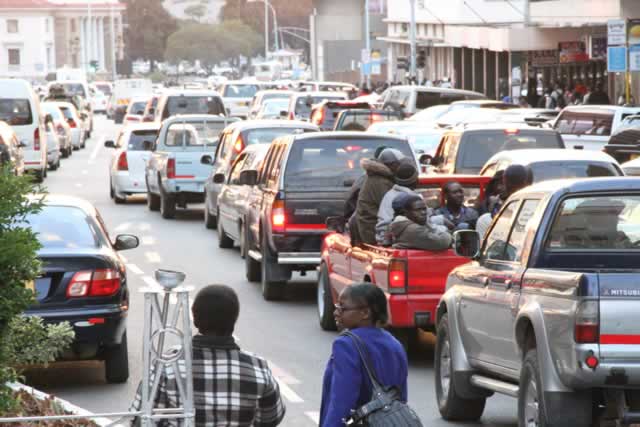Acute parking space woes hit Harare

 Herald Reporters
Herald Reporters
HARARE is facing an acute shortage of parking space, with statistics released recently showing that the city only has 7 000 on-street and parkade parking bays against almost 160 000 cars that enter the city each day.
The figures released through the city’s website are accompanied by a business proposal courting partners to develop parkades to ease the problem.
The figures were arrived at after a survey commissioned early this year, but another survey whose results are not yet out was done in October after realising that the number of vehicles in the city continued to rise.
A council official, who preferred anonymity, said they estimated the figures to have increased by almost 100 percent since the first survey, while the number of parking bays remained stagnant.
Council figures show that there are more than 800 000 vehicles registered in Harare alone, although the figure is disputed in some quarters.
Motorists said it was unfair for council to continue imposing heavy fines on them for parking their vehicles at undesignated areas when it was clear there was not enough parking space.
Council spokesperson Mr Leslie Gwindi said council was fully aware of the problem and acknowledged that the number of vehicles getting into the city centre was increasing daily.
“We are facing the parking space challenge and we are courting investors to construct new parking bays,” he said.
“The creation of parking bays for commuter omnibuses will also go a long way in addressing the challenge.
“Motorists should also assist because we cannot have a parking bay for each car. Even in cities like New York, parking space is a problem.”
Mr Gwindi said motorists did not necessarily have to park at their exact destination, but could park closer and walk there.
Town planner Mr Percy Toriro said the mismatch between demand for parking in the CBD and the available bays needed to be addressed as a matter of urgency.
“The council must build new parking garages and bays like in the 80s,” he said.
“With all the new cars since been bought, there is no other way out except to invest in new parking infrastructure in order to bridge this gap.
“In some cities outside Zimbabwe, the private sector has invested in parking as a business. Investors in property should consider a development mix that include parking. Joina City is already doing it.
“The measures should include supporting policies including the Ministry of Transport and Infrastructural Development’s proposal for urban tolling as a measure to manage CBD congestion.”
Motorists have called on the city to act fast on the matter as it is becoming a nightmare to drive and park in the city.
“I do not understand why the city has invested in patrol cars that go around clamping wrongly parked cars instead of just investing in parking bays,” said Mr Lawrence Nyabanga. “Where do they want us to park?”
Another motorist Ms Leslie Chitiza said the council should seriously consider the plight of city drivers.
“The city should not charge us heavily for parking at undesignated places because there is not enough parking for the growing numbers of cars, instead they should be investing in creating more parking space,” she said.
The city has since invited business partners to construct parkades and shopping malls at bus ranks such as Fourth Street, Copacabana, Market Square and Charge Office.
The construction of such parkades is expected to relieve the motorists, although that might not produce enough bays to address the problem.
In October, the Ministry of Transport and Infrastructural Development announced that the Government was considering urban tolling as a measure to decongest the cities, increase revenue and to reduce carbon emissions.
The proposal was met with mixed reactions, with some rejecting it totally, while others said it should be given a chance.
Harare City Council in its 2014 budget increased clamping and tow-away fees for illegally parked vehicles and those that violate the city’s traffic regulations from US$112 to US$423.
The proposal now awaits approval by Local Government, Public Works and National Housing Minister Dr Ignatius Chombo.











Comments